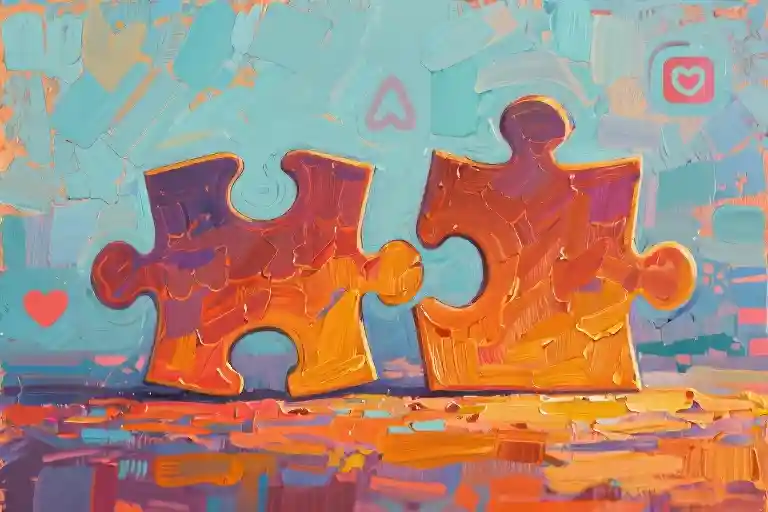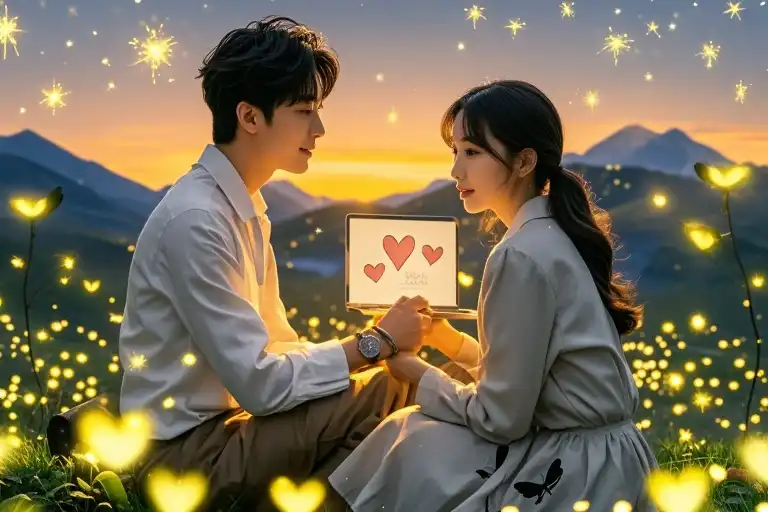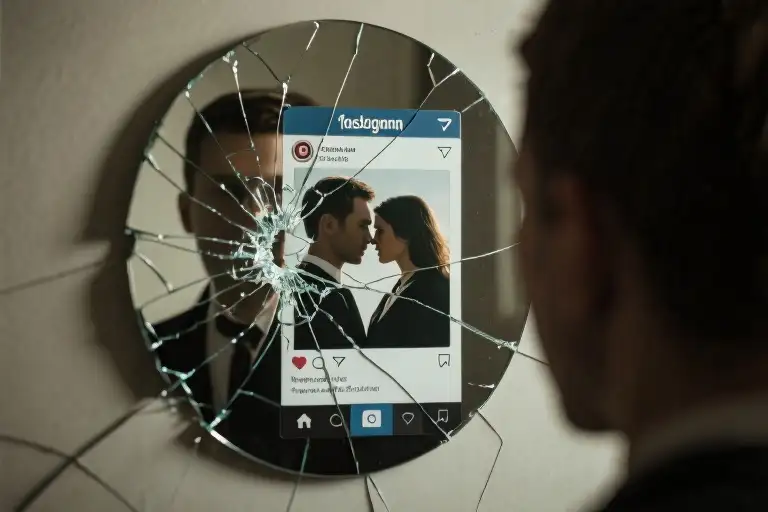The love industry has been feeding us the same fairy tale for decades—that somewhere out there exists a perfect match, a soulmate who’ll complete us. Dating apps amplify this myth with infinite scrolling and algorithmic promises, turning human connection into a never-ending audition where everyone’s simultaneously performer and critic.
Watch any modern dater for five minutes and you’ll see the pattern: swipe right until fingertips ache, settle for lukewarm connections, obsess over reply times, then repeat the cycle with growing exhaustion. We’ve turned romance into a strange hybrid of shopping spree and job interview, measuring potential partners against an impossible checklist while secretly wondering why genuine connection feels so elusive.
Here’s what nobody mentions in those glowing dating success stories: romantic pursuit operates by reverse psychology. The more desperately you chase love while feeling incomplete, the more it evades you like a mirage. This isn’t some mystical law of attraction—it’s basic human psychology. Insecurity radiates subtle cues that attract exactly the wrong kind of attention, while repelling those capable of healthy attachment.
Consider the physics of this paradox. Leaning too far forward while walking makes you unstable; grasping at water makes it slip through your fingers. Similarly, approaching relationships from emptiness rather than wholeness creates a dynamic where you’re always off-balance. That initial rush of infatuation? Often just the relief of temporarily escaping your own unresolved loneliness.
The uncomfortable truth is that many singles scrolling through profiles aren’t actually seeking love—they’re seeking an emotional safety net. There’s no shame in this; modern life amplifies isolation, making companionship understandably appealing. But confusing that legitimate need for support with romantic love is like using a Band-Aid for internal bleeding. It might cover the surface, but the real damage continues unseen.
This distinction explains why so many relationships follow the same disappointing arc: intense initial bonding fueled by mutual neediness, followed by resentment when neither person can sustain the other’s emotional weight. The very hunger that drives people together becomes what eventually tears them apart. Two people looking for completion in each other often end up feeling more fragmented than when they started.
Healthy relationships don’t begin with “fix me” energy. They grow gradually between individuals who’ve done the uncomfortable work of becoming whole on their own—people who choose each other not out of lack, but from genuine alignment. This doesn’t mean being perfectly healed (an impossible standard), but rather developing enough self-awareness to distinguish between love and emotional dependency.
Next time you catch yourself mindlessly swiping or overanalyzing a text thread, pause and ask: Am I seeking a partner or a pacifier? The answer might reveal more about your current emotional state than any dating profile ever could.
The Love Chase Fallacy
We’ve built entire industries around the idea of finding ‘The One.’ Romantic comedies, dating apps, self-help books – they all sell us the same fairy tale: that there’s a perfect person waiting to complete us. But this relentless pursuit often leaves us exhausted, scrolling through profiles like we’re browsing an endless catalog of human possibilities.
The swipe culture has fundamentally changed how we approach relationships. With thousands of potential matches at our fingertips, we’ve developed what psychologists call ‘the paradox of choice.’ That dating app user who shared her story – let’s call her Sarah – described it perfectly: ‘After my third date that week, I couldn’t even remember which guy had which job. They all blurred together, and yet I kept swiping because what if the next one is better?’ This isn’t dating – it’s emotional consumerism.
What makes this particularly insidious is how dating apps gamify human connection. The dopamine hit from a new match, the temporary validation when someone attractive responds – these mechanics keep us engaged but rarely lead to meaningful relationships. We’re not evaluating potential partners; we’re collecting validation points. The unspoken promise that ‘your perfect match is just one more swipe away’ keeps us trapped in this cycle, always chasing that hypothetical better option just over the digital horizon.
This mentality spills over into real-world dating too. That lingering thought during a decent date – ‘But could I do better?’ – isn’t about the person in front of you. It’s about the myth of perfection we’ve been sold. The truth no one mentions? Healthy relationships aren’t about finding someone flawless, but about choosing someone whose flaws you can live with – and who can live with yours.
The most damaging part of this chase isn’t the time wasted or the dates endured. It’s how this constant searching prevents us from ever fully investing in a relationship. When we approach dating like we’re always one swipe away from an upgrade, we never develop the patience or skills to work through normal relationship challenges. Every minor disagreement becomes proof we haven’t found ‘The One’ yet, rather than an opportunity to practice communication and compromise – the actual building blocks of lasting love.
Perhaps we need to stop asking ‘Is this the best I can do?’ and start asking ‘Am I showing up as the best version of myself in this connection?’ The shift from passive seeking to active building changes everything. Because the secret no dating app will tell you? You don’t find great relationships – you create them, one imperfect but intentional choice at a time.
Safety First, Love Second
The modern dating landscape often feels like an endless quest for an emotional life raft rather than a genuine connection. We scroll through profiles not with excitement, but with a quiet desperation—someone, anyone to ease the gnawing discomfort of being alone with ourselves. This isn’t about love. It’s about survival.
The Emotional Exit Strategy
Most dating profiles should honestly say: ‘Seeking human band-aid for existential dread.’ We’ve perfected the art of using relationships as distraction tactics from our own unaddressed voids. The texts we obsess over at 2am, the dates we force when we’re not really interested—they’re not about the other person. They’re about filling what therapist Esther Perel calls ‘the erotic space’ with noise so we don’t have to hear our own thoughts.
Social pressure acts as silent puppeteer here. By 30, the unspoken timeline demands we couple up like produce reaching its expiration date. Family gatherings become minefields of ‘So when are you settling down?’ as if singlehood were a temporary glitch rather than a valid life chapter. No wonder we start treating dating apps like emotional vending machines—insert enough swipes, out comes comfort.
The Loneliness Paradox
Here’s what nobody mentions about loneliness: it’s not cured by bodies in proximity, but by connection to self. That panicked first date after a breakup? The one where you talk too fast and laugh at unfunny jokes? That’s not dating—that’s emotional hostage negotiation. (‘If I can just get this person to like me, maybe I’ll believe I’m likable.’)
Research from the University of Toronto shows people who fear being alone will stay in unsatisfying relationships 40% longer. The brain literally registers loneliness as physical pain—no wonder we prioritize quick relief over quality connection. But like scratching a mosquito bite, the momentary relief only deepens the wound.
Motive Check: Are You Dating or Distracting?
Try this litmus test: When imagining your ideal partner, does your mind jump to what they can do for you (make you feel secure, validated, less lonely) or what you could create together? The former isn’t love—it’s outsourcing emotional labor. Healthy attraction sounds like ‘Your values resonate with mine,’ not ‘You make me forget I hate my job.’
Journal prompt: Track your dating impulses for a week. Notice when the urge to message someone coincides with:
- Late-night emptiness
- Seeing an ex post something
- Work stress
These aren’t openings for love—they’re flares signaling where you need self-care.
The Magnetism of Misery
Dating from emptiness creates a perverse gravity—it attracts those who sense your neediness like sharks smell blood. Not because they’re predators (though some are), but because broken parts recognize each other. The anxiously attached and the emotionally unavailable perform their familiar dance: one chases, one withdraws, both confirming their worst fears.
As psychotherapist Terry Real observes: ‘We don’t attract what we want, we attract what we think we deserve.’ When your inner monologue whispers ‘I’m too much’ or ‘Not enough,’ you’ll unconsciously seek partners who agree—not because you enjoy pain, but because it feels like truth.
The way out isn’t better partner selection, but dismantling the belief that you need saving. Next time you catch yourself swiping to numb anxiety, try this instead: Sit with the discomfort until it passes, like a storm cloud. Notice how survival didn’t require another person—just your own resilient presence.
The Codependency Trap
There’s an uncomfortable truth about dating when you’re not emotionally whole: the very emptiness you’re trying to fill becomes a beacon for the wrong kind of attention. This isn’t about blame—it’s about patterns. When we approach relationships from a place of lack, we unconsciously send out signals that attract people who thrive in those unbalanced dynamics.
Psychology explains this through the concept of emotional complementarity. Like puzzle pieces fitting together, those with a savior complex gravitate toward people who need saving. Those who feel powerful only when others are weak will seek partners who haven’t yet found their strength. It’s not malicious; it’s math. Your unresolved needs create vacuum energy that pulls in exactly what will keep you stuck.
Three warning signs you’re in a codependent dance:
- The Chameleon Effect: You notice your hobbies, opinions, even clothing style shifting to match theirs by the third date. Healthy relationships allow differences; codependency erases them.
- The Rescuer’s High: If you feel secretly proud of ‘helping’ them through crises (job loss, ex drama, mental health struggles) more often than you enjoy their company, that’s not love—that’s a savior complex.
- The Intimacy Illusion: Deep talks about trauma replace actual emotional connection. Bonding over shared wounds feels intimate but often prevents real intimacy from growing.
| Healthy Relationship | Codependent Pattern | |
|---|---|---|
| Conflict Resolution | Address issues to understand each other | Avoid conflict to maintain ‘harmony’ |
| Personal Growth | Encouraged separately and together | Seen as threatening to the connection |
| Time Apart | Refreshing and valued | Causes anxiety or accusations |
What makes this trap so insidious is how good it can feel initially. That intensity—the late-night soul-baring, the dramatic reconciliations—gets mistaken for passion. But fire needs oxygen to burn clean; relationships need boundaries to stay healthy. The moment you sense you’re losing yourself to keep someone close is the moment to pause.
The way out isn’t about blaming yourself or past partners. It’s recognizing that every time you tolerated breadcrumbs, every time you silenced a need to avoid rocking the boat, you were simply trying to solve an ancient equation: If I make myself small enough, will you finally stay? The answer, as you’ve likely discovered, is always no. Because love isn’t something you earn by self-erasure—it’s what flows naturally when you stop blocking it with desperation.
Here’s the quiet rebellion no dating app will tell you: Healing happens when you stop auditioning for love and start existing as your complete self. Not as a half seeking its other half, but as a whole person capable of choosing rather than clinging. That shift—from ‘Will they like me?’ to ‘Do I genuinely like them?’—changes everything.
Building on Solid Ground
The shift from “I need to be loved” to “I choose to love” isn’t about flipping a switch. It’s more like rewiring an old house where the electrical system was installed all wrong. You don’t tear down the structure – you methodically replace faulty wiring with something that won’t spark and burn when life turns up the voltage.
The Daily Repairs
- The Alone Test: Start with 15 minutes daily where you sit with nothing but your own company. No podcasts, no scrolling, no mental to-do lists. If anxiety creeps in (it will), observe it like weather passing through. The goal isn’t to enjoy solitude immediately, but to stop treating it like an emergency.
- Boundary Drills: Practice saying “no” to harmless requests – the extra shift at work, that friend who always needs rides. Each small refusal strengthens your ability to distinguish between generosity and self-abandonment. Healthy love requires this muscle memory.
- Desire Journal: For one week, record three things you genuinely want each day, however small (“iced coffee” counts as much as “career change”). We often chase relationships because we’ve lost the map to our own appetites.
When the Ground Shakes
Mia, a 28-year-old teacher, spent years cycling through intense but short-lived relationships. “I’d feel physically ill when someone didn’t text back,” she admits. Her breakthrough came during a six-month intentional single period where she:
- Deleted dating apps but kept their icons on her home screen as “willpower trophies”
- Scheduled Friday night “dates” with her sketchbook
- Stopped labeling nights alone as “lonely” and started calling them “uninterrupted”
“The moment I stopped needing a partner,” she says, “was when I finally started recognizing good ones.” Her current relationship began when she declined a third date with someone perfectly nice because “I realized I’d rather spend that evening trying a complicated pasta recipe.”
This isn’t about becoming some perfectly self-sufficient island. It’s about reaching for others from a place of overflow rather than deficit. Like learning to swim before grabbing onto someone else in deep water – you might still choose to hold hands, but you won’t drag each other under.
The Bedrock Principle
That house on quicksand from earlier? The alternative isn’t a fortress. It’s a porch swing on solid ground – sturdy enough to stay put when leaned on, but with room for someone to sit beside you when they choose to stay.
The House You Build
That image of the house on quicksand lingers, doesn’t it? We’ve spent this time together dismantling the fairytale, examining the shaky foundations of how we’ve been taught to pursue love. Now picture something different: solid ground beneath your feet. Not the kind that promises never to shift—life doesn’t work that way—but the kind that holds because you’ve learned to distribute your weight differently.
Healthy relationships aren’t found, they’re built. And construction always starts with the ground beneath the builder. When you stop chasing love from a place of hunger, something unexpected happens: you begin noticing who shows up to admire the architecture of your becoming. These aren’t people looking for someone to complete them, but individuals who’ve done their own foundation work.
Consider this question—not as homework, but as a thought experiment: How would you approach dating if you genuinely believed your wholeness wasn’t up for negotiation? Not as a lofty ideal, but as your baseline reality. You might still swipe (or not), still feel butterflies (or not), but the desperation would be gone. That quiet shift changes everything.
Try this small thing today: for one conversation with a potential partner, focus less on whether they like you and more on whether you genuinely like who you become around them. That subtle pivot holds more power than any dating strategy. It’s the difference between building on shifting sands and recognizing ground that can bear weight.
The healthiest love stories don’t begin with “I need you,” but with “I choose you.” And that choice carries meaning precisely because you know you could walk away intact. That’s the paradox no one mentions—real security comes not from clinging, but from developing the capacity to stand alone even as you choose to stand together.





